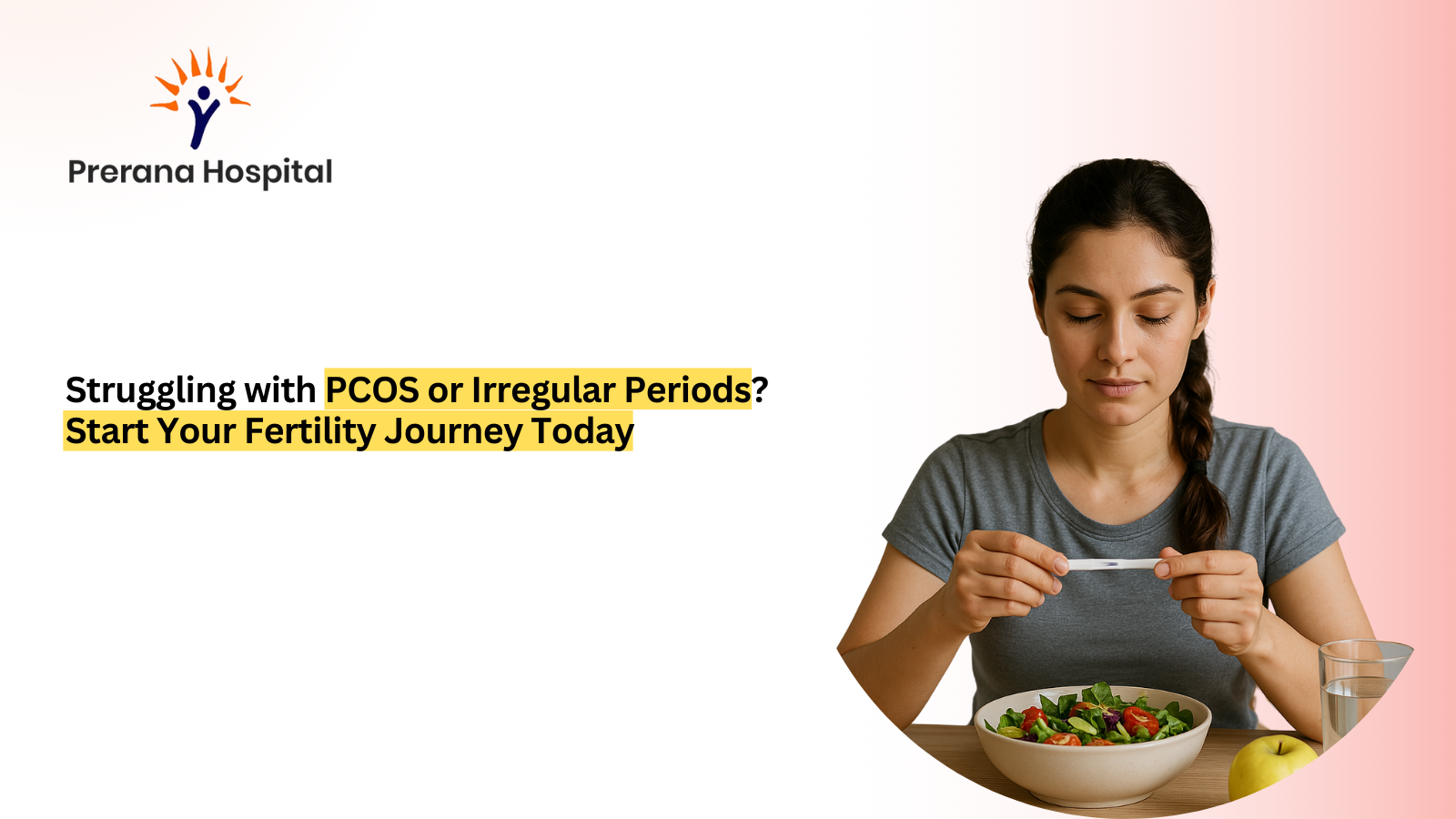

Please call +91 72042 70871 for outpatient appointments. The hospital is available for emergency 24/7.


Struggling with irregular periods and wondering if pregnancy is possible? Polycystic Ovary Syndrome (PCOS) is a common cause of fertility challenges that many women face. While it can make conceiving more difficult, the good news is that proper preparation and lifestyle adjustments can greatly improve your chances of conception and a healthy pregnancy. With the right approach, women with PCOS can increase their fertility potential and move toward a successful pregnancy.
This blog is here to provide practical steps and tips on how to prepare your body for pregnancy if you have PCOS or irregular periods, helping you improve your chances of conceiving.
Polycystic Ovary Syndrome (PCOS) is a hormonal disorder that impacts a significant number of women of reproductive age. It disrupts the normal balance of hormones in the body, particularly androgens (male hormones), which can interfere with ovulation. As a result, women with PCOS may experience irregular or absent periods, making it challenging to track ovulation and conceive.
In PCOS, the ovaries produce higher levels of androgens, which stop the ovaries from releasing eggs (ovulation). This hormonal imbalance is the primary reason for irregular menstrual cycles. Because ovulation is often unpredictable, it can be tricky to pinpoint the right time for conception.
Tracking ovulation is very important when trying to conceive. However, due to irregular cycles caused by PCOS, pinpointing ovulation can be difficult. This is why it’s important to use ovulation predictor kits or chart your basal body temperature to increase your chances of conception during your most fertile days.
By adopting these lifestyle changes, you are taking proactive steps to optimise your body for pregnancy. These practices not only improve your chances of conception but also prepare your body for a healthy and successful pregnancy journey:
A well-balanced fertility diet is key when preparing for pregnancy. Focus on whole foods, including vegetables, fruits, lean proteins, and healthy fats. Anti-inflammatory foods like berries, nuts, and fatty fish are particularly beneficial for reducing the inflammation caused by hormonal imbalances. A nutrient-dense diet can support hormonal balance and improve overall fertility.
For more tips on managing your diet with PCOS, check out this helpful blog on How Diet Affects PCOS.
Even a small reduction in weight, around 5-10% of your body weight positively impacts ovulation in women with PCOS. Maintaining a healthy weight helps regulate hormonal levels and improves the likelihood of ovulating regularly. A balanced diet combined with moderate exercise can help achieve and maintain a healthy weight.
Many women with PCOS experience insulin resistance, which can exacerbate hormonal imbalances and negatively affect fertility. Managing insulin resistance via diet and exercise can help manage blood sugar levels and improve ovulation. A low-glycemic diet, rich in whole grains, legumes, and vegetables, can help stabilise insulin levels and lower the effects of PCOS on fertility.
Stress can significantly affect reproductive health by increasing cortisol levels, which in turn interferes with the balance of other hormones. Practising stress-reduction techniques like meditation, yoga, or deep breathing exercises can help reduce stress levels. Additionally, improving sleep quality by maintaining a regular sleep schedule is vital, as adequate rest supports hormonal health.
While lifestyle changes play a significant role, medical interventions may be necessary to enhance fertility. These treatments, in conjunction with healthy habits, can significantly increase your chances of achieving pregnancy with PCOS:
For women with PCOS who struggle to ovulate, medications like Clomiphene Citrate (Clomid), Letrozole, and Metformin are commonly prescribed to induce ovulation. These medications stimulate the ovaries to release eggs, boosting the chances of conception. A fertility expert can guide you on the best course of treatment based on your individual needs.
Certain supplements can help balance hormones and support fertility in women with PCOS. Myo-inositol is often recommended to improve insulin sensitivity and ovulation. Folic acid is essential for preconception care, as it helps prevent neural tube defects in early pregnancy. Vitamin D is also crucial for hormone regulation and overall fertility.
Regular check-ups with your healthcare provider are essential to monitor your thyroid function and hormone levels. Thyroid imbalances can affect fertility, so it’s important to keep track of any potential issues and address them with appropriate treatment. Hormonal testing is also crucial to ensure that your levels are in balance for conception.
Preparing your body for pregnancy with PCOS or irregular periods requires a combination of lifestyle changes, medical intervention, and regular health monitoring. By optimising your diet, maintaining a healthy weight, managing stress, and considering medical treatments like ovulation induction, you can significantly improve your chances of conceiving and having a healthy pregnancy. Remember, every journey to parenthood is unique, and working with your healthcare provider to develop a personalised plan is key to success.
For more information on managing irregular periods, read What Are the Top Causes of Irregular Periods?
Are you ready to take control of your fertility? At Prerana Hospital, we offer expert guidance and personalised fertility treatments to help women with PCOS and irregular periods conceive. Contact us today and take the first step towards building your family.